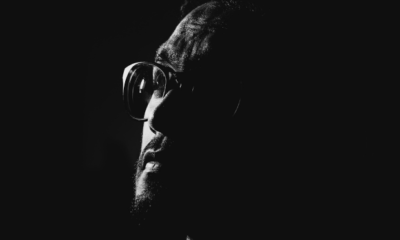Life
Here’s What’s Really Holding You Back in Life and How to Get Past It

If you’d like to learn how to let go of pain from your past so you can find bliss in your present life, sign up for the free 90-Day Master Class hosted by the founder of Addicted2Success.com, Joel Brown.
Can forgiveness bring healing into your life? What do you think? Are you finding positive experiences hard to come by in your life? Maybe good things do happen to you, but you’re so absorbed in negative emotions, you barely get the time to absorb in the beautiful moments that pass you by.
Your partner tells you they love you, yet you disregard it because you’re completely lost in anger at the person that gave you the finger in traffic two hours back. Then you wonder why your relationship lacks connection.
Don’t worry, we all get absorbed up in negative emotions. The problem is that most of us hang on to them for dear life. Every experience in your life, whether good or bad, produces an emotion in the body. The emotions you feel as a result of experiences then get stored as memories in your mind.
As a result, the collections of memories in your mind go on to create the mental movie by which you live your life. If the majority of your memories are positive, you’ll likely experience a romantic movie. Yet, when negative emotions get stored in abundance your mind movie can quickly turn into a thriller.
Given our mind’s negative bias, you are more likely to subconsciously experience the latter. Anger, fear, sadness and guilt are the main negative emotions by which most of us live our lives. This is because as memories get triggered day to day, you subconsciously relive the same feelings of a past experience, often trapping negative emotions in the body.
Given our tendency to avoid discomfort, when negative emotions become trapped in the body, the resistance creates stress and can strain all our bodily functions. This is why it is absolutely possible for trapped emotions to lead to health complications.
“Slow down and remember this: Most things make no difference.” – Tim Ferriss
Clinging to the past
Imagine you were bullied as a child, years have gone by since your ordeal, and you may now be vibrant and full of confidence. Yet, if you were to bump into one of your past bullies in the street, chances are your confidence would take a dip and you’d relive the fear and trauma tied to that past experience, even if the bully is now a really nice guy.
Your confidence after that encounter is then likely to take a while to build back up. This happens because you have clung onto, hidden and trapped the past negative emotions linked to being bullied.
The above situation will keep happening to you over and over again unless you address your emotions. You risk hampering all future positive moments in your life with unaddressed past emotions, for whatever reason they arise.
It’s the reason why unfortunately anxiety and depression are amongst the most common mental health disorders worldwide. People are always caught up and relive or anticipate past negative emotions.
“And in the end, it’s not the years in your life that count. It’s the life in your years.” – Abraham Lincoln
Forgiveness the path to healing
Your way out is confronting these emotions face to face, rather than suppressing them to forget. When you face your emotions, it’s then that you can begin to forgive and move on. Can forgiveness bring healing? Absolutely!
Forgiveness allows you to remove the shield of emotional pain you have stocked up over the years. When you can find it within you to forgive others and situations for any harm caused to you, you’ll find it within you to forgive yourself for feeling the emotions you are feeling.
Approaching your negative emotions with compassion and love while engaging in the act of forgiveness results in those emotions losing power over you. Given you’ve been suppressing your whole life, you will most likely have to forgive someone, a situation or yourself countless times in your mind until you notice a change.
Remember that each time you forgive, you are removing a layer of pain and rebalancing your emotional chemistry in the process. You will come to realize you have truly forgiven someone or yourself when you no longer feel any emotional reaction to the painful memory that crosses your mind.
The more you forgive and let go of all fear, anger, guilt, shame, and sadness the lighter and the more whole you will feel as a human being. The more you let go and vibrate positive energy, the more you will be able to attract and enjoy the positive experiences in your life.
So forgive the guy that gave you the finger in the morning traffic and let it go. Go tell your partner you love them instead of fighting or being angry. You’ll come to realise that your lucky night was within your control all along.
Do you have any suggestions on ways to let go of things from the past? If so, please share some of your advice with us below!
Life
Why Moving to a New City Can Change Your Mindset
Discover how moving to a new city boosts neuroplasticity, builds resilience, and reshapes your mindset

Relocation is always a challenge. Rebuilding and restarting your life requires you to step outside of your comfort zone. (more…)
Change Your Mindset
The Hidden Reason You Can’t Stay Consistent
If motivation keeps failing you, the real issue isn’t discipline. It’s the identity shaping your habits and long-term success.

Success often looks like a time-management problem. You buy a planner, set reminders, and hope that next week will be different. For a few days, it works. Then stress hits, motivation drops, and old patterns return. (more…)
Did You Know
How Skilled Migrants Are Building Successful Careers After Moving Countries
Behind every successful skilled migrant career is a mix of resilience, strategy, and navigating systems built for locals.

Moving to a new country for work is exciting, but it can also be unnerving. Skilled migrants leave behind familiar systems, networks, and support to pursue better job opportunities and a better future for their families. (more…)
-

 Business4 weeks ago
Business4 weeks agoWhy Entrepreneurs Should Care About AI Automation Testing
-

 Business4 weeks ago
Business4 weeks agoWhy Smart FMCG Entrepreneurs Outsource What They Can’t Automate
-

 Business3 weeks ago
Business3 weeks agoWhat Every Business Owner Should Know Before Investing in API Integration
-

 Did You Know4 weeks ago
Did You Know4 weeks agoThe SEO Traps Even Experienced Marketers Fall Into
-

 Business3 weeks ago
Business3 weeks agoWhy Smart Entrepreneurs Are Quietly Buying Gold and Silver
-

 Business2 weeks ago
Business2 weeks agoHow Smart Brands Use Instagram Data to Outperform Competitors
-

 Business3 weeks ago
Business3 weeks agoThe Paradox of Modern Work: Can Tech Make Us More Human?
-

 Business2 weeks ago
Business2 weeks agoHow AI Agents Can Quietly Expose Your Business to Serious Risk





























